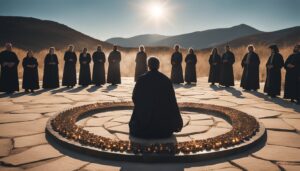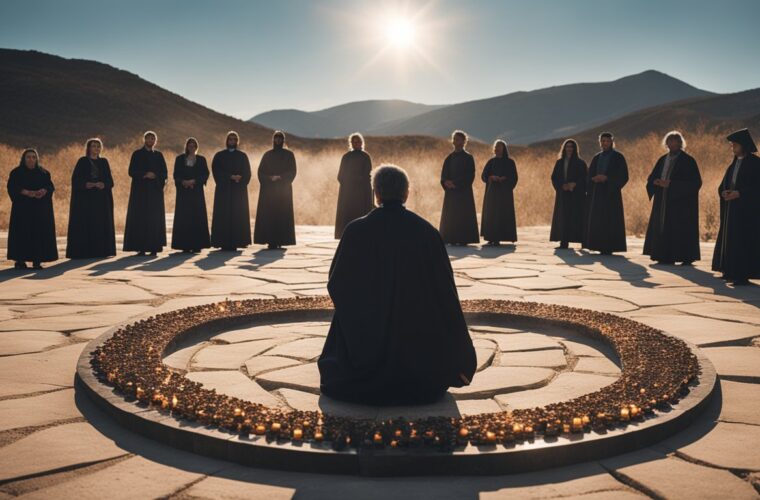Are you interested in harnessing the power of the solar eclipse for spiritual growth? Solar eclipses have been considered significant events throughout history, and many cultures have developed unique solar eclipse rituals to honor and harness the energy of these celestial phenomena. Whether you’re looking to set intentions, release negative energy, or simply connect with the universe, there are a variety of solar eclipse rituals that can help you tap into the transformative power of this cosmic event.
Solar eclipses occur when the moon passes between the earth and the sun, casting a shadow on the earth’s surface. These events have been celebrated and feared throughout history, with many cultures developing unique interpretations and rituals surrounding eclipses. For example, in ancient China, people believed that a solar eclipse was caused by a dragon devouring the sun, and they would bang drums and pots to scare the dragon away. In Hindu mythology, eclipses are said to be caused by the demon Rahu, and people perform special prayers and rituals to protect themselves from his influence.

Whether you’re interested in ancient traditions or modern spiritual practices, there are many solar eclipse rituals that can help you harness the energy of this powerful event. From crystal healing to meditation to journaling, there are a variety of ways to connect with the universe and set intentions for the future during a solar eclipse. So why not take advantage of this rare and transformative event to elevate your spiritual practice and cultivate positive change in your life?
Historical Background of Solar Eclipse Rituals
Solar eclipses have been observed and interpreted by humans for thousands of years. Ancient civilizations had varying beliefs and rituals surrounding these celestial events. In some cultures, solar eclipses were seen as omens or warnings of impending disasters, while in others they were viewed as opportunities for personal growth and transformation.
One of the earliest recorded observations of a solar eclipse comes from China in 2137 B.C. Chinese astronomers Hi and Ho worked to notate and predict the movements of the sun and moon, as well as solar eclipses, in order to keep track of the calendar for the emperor’s court. This demonstrates the importance of astronomical observations for practical purposes such as timekeeping.
In ancient Babylon, solar eclipses were seen as omens of impending disaster, particularly for the king. Babylonian scholars believed that eclipses could foretell the death of the king and would perform rituals to preempt this fate. The level of astronomical knowledge achieved in ancient Babylonia cannot be separated from the astrological tradition that regarded eclipses as omens.
In many indigenous cultures, solar eclipses were seen as times of great power and mystery. They were often associated with important life events or natural disasters. For example, the Maya culture gave different interpretations to eclipses. The solar eclipse was interpreted as the Sun God expressing his fury or demanding rituals. The Maya believed that the sun and moon were powerful deities that influenced the lives of humans.
Overall, solar eclipses have played a significant role in the beliefs and rituals of many cultures throughout history. While the interpretations and practices surrounding these events vary widely, they all demonstrate humanity’s fascination with and reverence for the celestial world.
Cultural Significance of Solar Eclipses
Solar eclipses have been observed and interpreted by various cultures throughout history. They have been seen as a sign of impending doom, a time for reflection and introspection, and a chance to connect with the divine. In this section, we will explore the cultural significance of solar eclipses, both in ancient civilizations and modern interpretations.
Ancient Civilizations
Many ancient civilizations saw solar eclipses as a powerful omen, a sign of impending disaster or change. The ancient Chinese believed that a solar eclipse was caused by a dragon eating the sun, and that it was a warning of bad times ahead. In ancient Greece, a solar eclipse was seen as a sign of the anger of the gods, and was often accompanied by sacrifices and other rituals to appease them.
In other cultures, solar eclipses were seen as a time for reflection and introspection. The ancient Maya believed that a solar eclipse was a time when the sun god expressed his fury or demanded rituals. They would often hold ceremonies and make offerings to appease him.
Modern Interpretations
In modern times, solar eclipses are still seen as a time of wonder and awe. Many people travel to see them, and there are often celebrations and festivals surrounding them. However, there are also more scientific interpretations of solar eclipses. They are seen as a chance to study the sun and its effects on the Earth, and to learn more about our place in the universe.
In addition, solar eclipses have also become a time for spiritual reflection and meditation. Many people see them as a chance to connect with the divine, to reflect on their own lives, and to gain a deeper understanding of the world around them.
Overall, solar eclipses have held a significant cultural significance throughout history. Whether seen as a sign of impending doom or a chance for spiritual reflection, they have captivated the imaginations of people across the globe for centuries.
Contemporary Solar Eclipse Rituals
If you’re looking for ways to celebrate the solar eclipse, you’re in luck. There are a variety of contemporary rituals you can participate in that will help you connect with the energy of the eclipse.
Scientific Observances
Many scientists and researchers use solar eclipses as an opportunity to study the sun and the Earth’s atmosphere. During an eclipse, the moon blocks the sun’s light, allowing scientists to study the sun’s corona, the outermost layer of its atmosphere. Scientists also use the eclipse to study the Earth’s atmosphere, as the sudden drop in temperature and light can have an impact on the ionosphere, the upper layer of the Earth’s atmosphere.
Community Gatherings
Many communities come together to celebrate the solar eclipse. Community gatherings can take many forms, from picnics and barbecues to music festivals and art shows. Some communities organize guided hikes and nature walks, while others offer educational workshops and lectures. Whatever form they take, community gatherings are a great way to connect with others and celebrate the power of the sun and the moon.
If you’re interested in participating in a community gathering, check with your local parks and recreation department, library, or community center to see if they have any eclipse-related events planned. You can also check online for events in your area, or organize your own gathering with friends and family. Remember to follow proper safety precautions when viewing the eclipse, and have fun celebrating this rare and powerful event.
Safety Measures During Solar Eclipses
While solar eclipses are exciting events to witness, it is important to keep safety in mind. Looking directly at the sun during an eclipse can cause permanent damage to your eyes. Here are some safety measures you can take to protect yourself during a solar eclipse:
1. Use Proper Eye Protection
The only safe way to look directly at an uneclipsed or partially eclipsed sun is through special-purpose solar filters, such as eclipse glasses or hand-held solar viewers. Homemade filters or ordinary sunglasses, even very dark ones, are not safe for looking at the sun. Ensure that your solar filters are ISO 12312-2 compliant to protect your eyes.
2. Avoid Looking at the Sun with Unprotected Eyes
Do not look at the sun with unprotected eyes, even if it is partially eclipsed. The sun’s UV radiation can cause permanent damage to your eyes. If you do not have proper eye protection, use indirect viewing techniques, such as pinhole projection, instead.
3. Protect Your Skin
The sun’s UV radiation can also harm your skin during a solar eclipse. Make sure to apply sunscreen with a high SPF to any exposed skin, and wear protective clothing, such as long-sleeved shirts and pants.
4. Be Prepared
Before the eclipse, make sure you have all the necessary equipment, such as solar filters, sunscreen, and water. Also, be aware of your surroundings and stay away from any dangerous areas, such as high cliffs or bodies of water.
By following these safety measures, you can enjoy the solar eclipse without putting yourself at risk.




